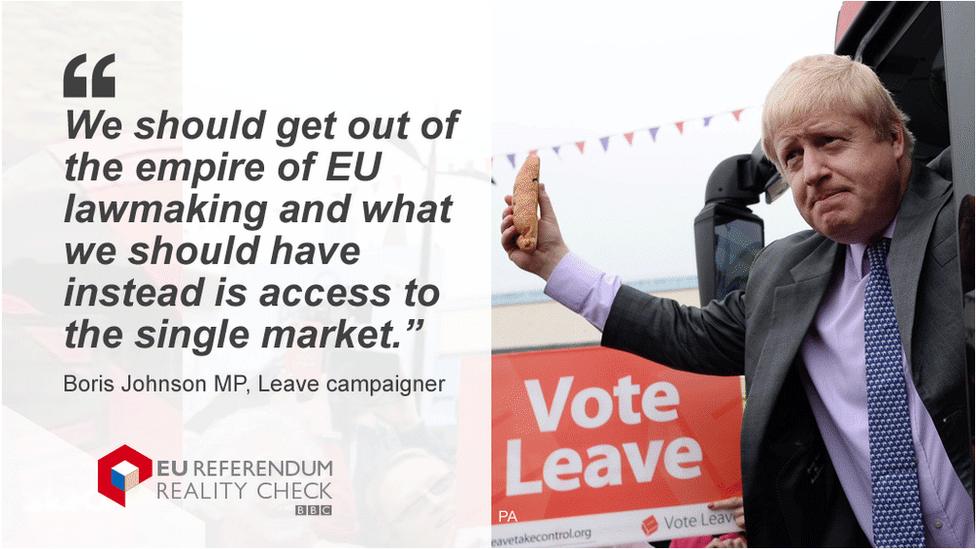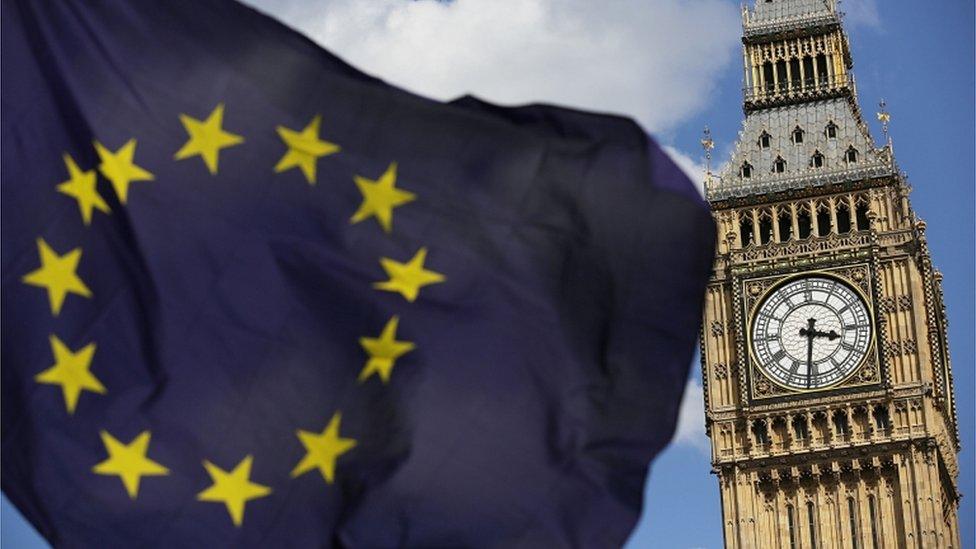Reality Check: Who has access to the single market?
- Published

The claim: The UK would continue to have access to the single market after leaving the European Union.
Reality Check verdict: The UK could continue to trade with the single market following an EU exit, but we do not know on what terms that trade would take place because that would be subject to years of negotiations.
On Wednesday morning at the start of his Vote Leave bus tour, Boris Johnson said the UK should get out of the single market but have access to it.
What do we mean by access? And if Britain leaves the European Union, what sort of relationship would it have with the single market?
What is the single market?
In the early 1990s the common market grew into the single market we know today.
At its heart is a free trade area, which is a market where there are no tariffs or taxes on trade between countries. While its members can trade freely with each other, they also impose common tariffs on imports from non-EU countries.
Being a member of the single market means a country gets the benefit of any trade deal struck between the EU and other countries - the flip side is that member states cannot set their own tariffs.
But the EU's single market is much more than a straightforward free trade area, because it also includes the free movement of goods, people and capital.
Crucial to the single market is a common framework of regulations that mean companies in countries such as the UK, France, Italy or Poland have to abide by common standards - whether they trade across the EU or not. That is to stop one business or country having an unfair advantage. Most countries in the single market also have a single currency - the euro - but the UK has not adopted it.
Who has access to the single market?
Any countries that are not subject to trade sanctions can trade with members of the single market, as Boris Johnson said.
But there is a big difference between being able to trade with the single market and being a member of it. For instance, the United States sells into the single market but there are no common safety standards for goods such as fridges or cars and tariffs and quotas may be imposed on its products.
The 28 members of the European Union are full members of the European Economic Area - the single market. But there are other members of the club too.
The four members of the European Free Trade Association also participate in the single market - but to different degrees.
Take Norway for instance. Norway has full access to the single market but is not in the EU. It pays a contribution to the EU Budget to gain that access and has to sign up to all the rules of the club - including its common regulations and standards.
People from across the EU are free to live and work in Norway too, but the country is exempt from EU rules on agriculture, fisheries, justice and home affairs. The downside for Norway is that it has no say over how the rules of the Single Market are created.
Another example is Switzerland. It has a free trade agreement with the EU and a number of bilateral agreements, which give it access to the Single Market for most of its industries.
However, it does not have full access to the single market for its banking sector.
If Britain left the EU how would it gain access to the single market?
In the past week, Leave campaigners have confirmed that they would not want to remain part of the single market by signing deals similar to Norway or Switzerland.
They say that because of the strength of the UK economy and the need for EU countries to continue trading freely with the UK, Britain would be in a very strong position to get a deal that exempted the UK from free movement and single market regulations while allowing free access to the single market.
Because the UK already complies with single market regulations, a UK-EU free trade deal on goods may be fairly straightforward.
But the UK's service sector is about 80% of our economy and the City of London dominates financial services in the EU. In the negotiations that would follow a British exit from the EU everything would depend on the deal the remaining EU members wanted to cut.
And the Remain campaign insists the EU would demand the UK accepts free movement and common regulations in any deal that provides single market access.
We do not know what the outcome of such negotiations would be - it is one of the biggest question marks hanging over this referendum.



- Published14 August 2017

- Published22 February 2016
